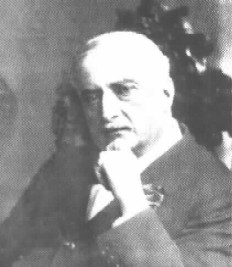|
 Born
1st Sep 1856, Ballytrent, County Wexford.
Eldest son of William Redmond, MP for Wexford; educated at Clongowes
Wood College and Trinity College Dublin. He became a clerk in the House
of Commons and was called to the Irish bar in 1886. Elected MP for
New Ross in 1881, he became a devoted follower of Parnell. He made a
successful political mission to Australia and America 1882–84, raising
£30,000 for the Irish Party’s funds.
After the
the O’Shea divorce case in 1890 and the demise of Parnell, the Irish
Parliamentary Party split into several factions. Redmond led the
minority that supported Parnell. Elected Parnellite member for Waterford
in 1891, he held the seat until his death. When the party was united
again in 1900 Redmond became leader. He was
an influential member of the Land Conference of 1902, from which came
the Land Act (1903), which gave a dramatic impetus to tenant land
purchase. He was involved in long-drawn-out negotiations that resulted
in the foundation of the National University in 1908. After years of
political manoeuvring against delaying tactics by the Liberals he
secured the introduction of the third Home Rule Bill in 1912. The
opposition of the Ulster Unionists led by Carson took him by surprise,
and the Irish Volunteers were formed and led by those who had no
sympathy with his policy of constitutional reform by parliamentary
methods. When the First World War broke out
in August 1914 Redmond proposed in the House of Commons that Ireland
should be guarded by the Volunteers, north and south, and British troops
withdrawn. The government ignored this and thwarted his efforts to have
a distinctive Irish division formed to correspond to that approved for
Ulster. Despite these rebuffs he continued to encourage Irishmen to join
the British forces and his famous
speech
at Woodenbridge, Co. Wicklow, in which he exhorted the Irish
Volunteers to fight, shows how much he believed that WWI was about the
fate of small nations and in defence of liberty. The 1916 Rising was a
shattering and completely unexpected blow to his policy. Nevertheless he
struggled on and in 1917 suggested that a convention of Irishmen be held
in Dublin to draft a constitution for Ireland within the British empire.
The convention met in July 1917 and had made little headway when Redmond
died suddenly on 6 March 1918. He was buried in Wexford. Born
1st Sep 1856, Ballytrent, County Wexford.
Eldest son of William Redmond, MP for Wexford; educated at Clongowes
Wood College and Trinity College Dublin. He became a clerk in the House
of Commons and was called to the Irish bar in 1886. Elected MP for
New Ross in 1881, he became a devoted follower of Parnell. He made a
successful political mission to Australia and America 1882–84, raising
£30,000 for the Irish Party’s funds.
After the
the O’Shea divorce case in 1890 and the demise of Parnell, the Irish
Parliamentary Party split into several factions. Redmond led the
minority that supported Parnell. Elected Parnellite member for Waterford
in 1891, he held the seat until his death. When the party was united
again in 1900 Redmond became leader. He was
an influential member of the Land Conference of 1902, from which came
the Land Act (1903), which gave a dramatic impetus to tenant land
purchase. He was involved in long-drawn-out negotiations that resulted
in the foundation of the National University in 1908. After years of
political manoeuvring against delaying tactics by the Liberals he
secured the introduction of the third Home Rule Bill in 1912. The
opposition of the Ulster Unionists led by Carson took him by surprise,
and the Irish Volunteers were formed and led by those who had no
sympathy with his policy of constitutional reform by parliamentary
methods. When the First World War broke out
in August 1914 Redmond proposed in the House of Commons that Ireland
should be guarded by the Volunteers, north and south, and British troops
withdrawn. The government ignored this and thwarted his efforts to have
a distinctive Irish division formed to correspond to that approved for
Ulster. Despite these rebuffs he continued to encourage Irishmen to join
the British forces and his famous
speech
at Woodenbridge, Co. Wicklow, in which he exhorted the Irish
Volunteers to fight, shows how much he believed that WWI was about the
fate of small nations and in defence of liberty. The 1916 Rising was a
shattering and completely unexpected blow to his policy. Nevertheless he
struggled on and in 1917 suggested that a convention of Irishmen be held
in Dublin to draft a constitution for Ireland within the British empire.
The convention met in July 1917 and had made little headway when Redmond
died suddenly on 6 March 1918. He was buried in Wexford. |